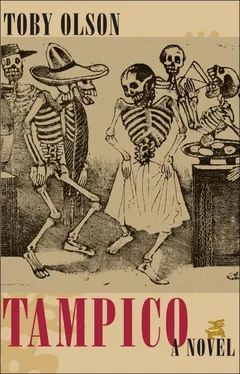I turned away from the dancing skeletons blocking the exit. Only I had been watching them. Everyone in the crowded square had paused and was looking at me, at my scarlet face, my hunched body and my hands clutching my chest. I tried to rise, imagining escape from that place, the hotel and the suitcases and the bed, and a place under the blanket and between the cool white sheets. But I was falling, knowing that the pounding in my stomach and chest was heart attack and that I would soon be dead. And I was embarrassed in my panic and falling, to have all these people watching me, learning of my single most shameful secret, the one that must be kept, lest they find out who I really was.
And that was the first time, but it was not the only time. In the second I was in the meadow on my way to the Manor. Fog had come in, and when I looked up the Manor was lost in it, and when I turned around the house was gone. Then that fist was closing in my chest again, gripping my heart, and I was falling to the ground.
The policeman stood among the old men at the fence. John had climbed into his wheelchair and was rocking it back and forth on the blacktop, and I saw Gino step away from the others and head around the fence toward the side of the lighthouse. The policeman went after him and Frank took the opportunity and turned to the gate again and rattled it on its hinges. Then Gino and the policeman were back and Larry was shrugging his shoulders and stepping toward the car. The others followed him, though haltingly, and when they reached the car door John climbed up out of his wheelchair, Frank holding his arm, and the policeman folded it and went to the trunk and opened it and put it inside as the men climbed in through the doors. Then the car was turning, its headlights washing across the beams, and once it had gone back up the road, the lighthouse and equipment were left in moonlight bright enough so that I could almost read the stop work order sign so recently attached at the gate’s side.
They’d come upon a river in their digging, unknown to them though they had made test borings, when they were putting in footings for the second set of hydraulic jacks. They’d had to work in winter, pushing their spring schedule back because of recent erosion caused by serious winter storms. They’d dug deeper then, under the lighthouse itself, and sand had fallen down into an old watercourse, threatening firmer ground near the lighthouse base, and they’d had to shore up the perimeter with heavy timbers and more footing and reconsider things. Engineers and politicians had come out, and the word had gotten back to Washington and the funding was put on hold, as was the project itself, though the crest behind the lighthouse was in increasing danger of further erosion should there be more storms. Now there were considerable rage and frustration on all sides. The project was lost in politics, and those concerned could only keep their fingers crossed and wait it out.
I cannot get to the Manor on foot anymore, though I can see it and the house too out the windows of Arthur’s car as we drive through the meadow. Arthur has rigged up curtains, and I can close them if I need to, and there have been good days, though long ago, when Arthur drove slowly and I walked at the side of the car, my hand gripping the frame of the open window. The house is safe and the open porch is safe, and I can step a few feet toward the crest, so long as I can see the porch. The car’s okay, though there have been tough moments from time to time, and I’ve worked at the Manor for over fifteen years, and it’s safe. I’m thirty-eight years old now and I don’t need the work, but it keeps me among people and I need that. Arthur gets my groceries and takes the trash away and drives me back and forth to work, and I have his fee and the utilities and food, and there’s enough in the bank to cover that. I have no friends, though I’ve had women and some men too over for dinner, and once I had a lover, but that was long ago. I had my two beautiful bettas in a tank in my bedroom, but the female died in June, and just last night the other failed.
The Manor seems to be failing too, and each of the four doctor-owners, one of whom comes daily, seems to be waiting only for the men to die so they can put the place up for sale and get out from under. It had its good days once, when it was a private home for the aged. There’s plenty of land there, and a view, and the wealthy used it. But then they began to bring the old men in, on a good contract from the Veterans Administration, and the wealthy drifted away. Now the Administration has withdrawn the contract, is consolidating and closing such satellites. And when the old men die, Lisa the day nurse told me, that will be the end of it.
The old men seldom speak of war, and the visible remnants of their injuries, John’s scar and Gino’s angry burns, seem to have nothing to do with war, nor do their psychological states as far as I can tell. The time in service that got them to the Manor is in a distant past. Gino, though he’s a hundred now, is spry, but there’s an absence that I’ve noticed in his face, some unfinished business, and I think I’ve seen the same in Frank. I can’t tell about Larry yet, he’s new and is still learning to get his feelings through his tracheotomy. The therapist comes once a week, but his work seems perfunctory. The doctors don’t care, and I think he must sense that, and any real movement toward articulation is left to the men themselves. It’s that they need to tell their stories again before they die that keeps them working at it.
The man behind the screen in the solarium haunts me. I was there when they drove him up from the lighthouse in the bed of a pickup truck, and the doctor was still there. It was near the end of my shift and Carolyn had come in, and I stayed for an extra hour, Arthur out in the car waiting for me, and helped to get him settled. The doctor was excited, not sure that the blow was cause of the man’s continuing unconsciousness and curious about it. “It’s the kind of thing I do,” he said, and I could hear an interest in his voice that had never been there when he’d spoken of the old men. He said it was definitely coma, most probably from shock. There was swelling where the heavy board had struck his temple, but not much. “We’ll just have to run the X-rays, blood work and some other tests, and watch him.”
This was a week ago and still he sleeps, and on my shift I pass into the solarium often to check the drip and pressure, though it’s not always necessary.
There’s something about his body and about his face. His arms are like the smooth arms of a woman where they rest along his sides on the sheet that covers him, but under his thick skin there’s muscle close to the surface, and when I lifted the right one to pull the sheet away it was heavy, and I saw that his legs had the same properties as his arms and that his hairless chest did too. His waist is thick, his stomach flat and hard, and below it his penis and small scrotum rest on a slight mound at the center of the broad girdle his hips make, womanish again, but not really that. There’s no woman’s fat, but smooth sinew and the bulge of tendons running out into his legs from their insertion in his groin.
He’s a small man, no taller than I, and his brow is broad and unlined, like smooth stone, and below the lids of his deep set eyes, his nose thick and slightly flattened above the line of his thin lips, his chin is small and rounded, what’s called a weak chin, though there’s power in the flat slabs of his cheeks above it.
I know his eyes are black eyes, because I’ve lifted his lids. And his hair is black too, each strand like a small braid, rich with natural oil where it lies shining on the pillow. He’s forty-three years old, but his face shows nothing of the wear of experience. It might as well be a child’s face, or the face of a very old man who has gotten beyond any care for experience. It’s a face like ones I think I saw in Tampico, but only in glimpses in reflections in store windows, and like those of children gathered in the skirts of their mothers passing on the street in my brief stay there. And I wonder about the ways his face might move when he awakens and what his voice will sound like beyond the deep sighs and groaning I’ve managed to draw out of him in our time together.
Читать дальше












